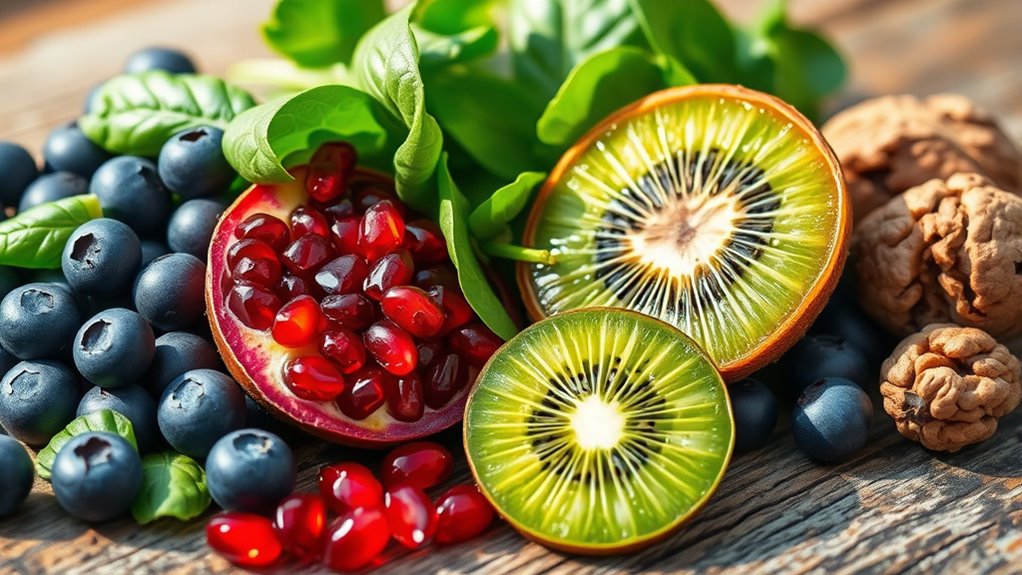To naturally boost collagen after 40, focus on eating protein-rich foods like chicken, eggs, and bone broth, which supply key amino acids. Prioritize vitamin C from citrus and leafy greens to support collagen synthesis, and stay hydrated to keep your skin elastic. Incorporate antioxidant-rich foods and enjoy regular exercise while protecting your skin from UV rays. Using topical treatments and supporting overall health will help preserve your collagen; discover how to optimize these strategies further.
Key Takeaways
- Consume protein-rich foods like chicken, eggs, and fish to provide amino acids vital for collagen synthesis.
- Ensure adequate vitamin C intake from citrus, berries, and leafy greens to support collagen stabilization and maturation.
- Incorporate antioxidant-rich foods such as berries, nuts, and tomatoes to protect collagen from oxidative damage.
- Practice sun protection with sunscreen and protective clothing to prevent collagen breakdown caused by UV rays.
- Use collagen supplements and topical products to enhance skin hydration, elasticity, and support collagen repair.
Emphasize Protein-Rich Diets for Collagen Building

A protein-rich diet is crucial for supporting collagen production, especially after 40 when natural synthesis starts to decline. Key amino acids like glycine, proline, and hydroxyproline are essential for building a strong collagen matrix. Glycine and proline are abundant in foods such as chicken, eggs, and grass-fed beef, directly contributing to collagen synthesis. Tryptophan, which supports overall protein balance, is also important, though it’s absent in collagen itself. Combining these proteins with sources like whey or fish oil can further support collagen’s stability and turnover. Consuming foods rich in collagen or amino acids helps improve skin elasticity, joint health, and wound healing. Additionally, understanding collagen synthesis can help you optimize your diet for better results. Ensuring a variety of these protein sources maximizes amino acid availability, enhancing collagen production, and boosts your body’s ability to produce and maintain healthy collagen levels as you age. Regular intake of these nutrients also promotes myelination, supporting efficient neural communication and overall brain health. Incorporating antioxidant-rich foods can also help protect collagen fibers from oxidative damage, further supporting skin and joint health.
Prioritize Vitamin C for Collagen Maturation and Strength

To strengthen your collagen after 40, prioritizing vitamin C is essential, as it acts as a vital cofactor for collagen-maturing enzymes. Including rich sources like citrus, berries, and leafy greens in your diet or using supplements can support this process. Ensuring adequate vitamin C levels helps stabilize collagen fibers, improving skin firmness and tissue strength. Additionally, maintaining proper calibration of your collagen production can optimize overall skin health. Exploring the benefits of remote hackathons and other collaborative tech events can also inspire innovative approaches to health and wellness. Given the importance of AI safety measures in technological applications, staying informed about advancements can help you make better health decisions. Incorporating nutrient-dense foods into your diet is also beneficial for supporting collagen synthesis. Regularly monitoring skin health and hydration levels can further enhance collagen maintenance and overall skin vitality.
Vitamin C’s Role
Vitamin C plays a pivotal role in collagen maturation and strengthening by acting as an essential cofactor for key enzymes like lysyl hydroxylase and prolyl hydroxylase, which are responsible for stabilizing and cross-linking collagen fibers. It helps stabilize collagen mRNA, boosting collagen protein synthesis, and stimulates procollagen production in fibroblasts. Supporting collagen synthesis Vitamin C also prevents the auto-inactivation of these enzymes, ensuring continuous collagen production. It promotes hydroxyproline formation, vital for collagen stability, and increases collagen type I deposits in skin cells. This results in a denser, stronger collagen network within your dermis, supporting skin elasticity and firmness. Maintaining collagen density is crucial as it helps counteract age-related decline, contributing to healthier, more resilient skin after 40. Regular use of vitamin C-rich skincare can further enhance these effects by providing targeted collagen support. Additionally, understanding how projector compatibility with skincare devices can optimize treatment outcomes is beneficial for comprehensive skin health.
Food Sources Rich in Vitamin C
Incorporating foods rich in vitamin C can considerably support your body’s collagen production and strength after 40. These foods provide essential nutrients that promote collagen maturation and help maintain skin elasticity. Fruits like oranges, strawberries, and kiwifruit are excellent sources, along with vegetables such as red peppers, broccoli, and kale. Incorporate a variety of these to optimize collagen support.
| Food Source | Vitamin C Content per Serving |
|---|---|
| Oranges | 70 mg |
| Strawberries | 59 mg |
| Red Peppers | 95 mg |
| Broccoli | 81 mg |
| Kiwifruit | 92 mg |
Supplementing for Collagen
Supplementing with vitamin C is a powerful way to support collagen maturation and strengthen your skin after 40. This essential nutrient acts as a cofactor for enzymes that hydroxylate proline and lysine, vital steps in forming stable, mature collagen fibers. Without enough vitamin C, these processes falter, leading to weaker connective tissue. Additionally, vitamin C boosts collagen gene expression and stabilizes mRNA, increasing collagen production. Using supplements or derivatives like vitamin C-glucoside can enhance stability and absorption. Here’s what you should know: 1. Proper dosing ensures ideal collagen synthesis. 2. Derivatives boost stability and efficacy. 3. Consistent intake supports extracellular matrix strength. 4. Enhanced collagen network improves skin elasticity and resilience. 5. Incorporating Vitamin C-rich foods or supplements can further optimize collagen production and skin health. Regular supplementation also supports collagen synthesis by providing the necessary nutrients for efficient production. Incorporating nutrients essential for collagen formation ensures a comprehensive approach to skin health and longevity.
Incorporate Bone Broth and Collagen Supplements

Adding bone broth and collagen supplements to your routine can effectively boost collagen levels after 40. Bone broth offers amino acids like glutamine, glycine, and arginine, which support gut health and immune function, but its collagen content is low compared to supplements. It also provides nutrients like calcium and magnesium that promote bone health. Collagen supplements, especially hydrolyzed collagen, are easier for your body to absorb and have strong evidence supporting improvements in skin elasticity and joint comfort. They deliver concentrated collagen and key amino acids necessary for collagen synthesis. While bone broth is more affordable and customizable, supplements offer higher potency and targeted benefits. Both can complement your efforts to maintain youthful skin and joint health, but quality and dosage should be carefully considered to avoid potential side effects. Ensuring proper absorption of collagen supplements can maximize their benefits. Incorporating nutrient-dense foods into your diet can further support collagen production and overall skin health. The integration of AI-driven research into healthcare is revolutionizing how we approach anti-aging strategies, making it easier to find effective solutions. Vetted options for effectiveness and safety can guide your choices.
Consume Antioxidant-Rich Foods to Protect Collagen

Focusing on your diet can considerably protect your collagen levels as you age. By eating antioxidant-rich foods, you defend your skin from oxidative stress and slow collagen breakdown. Here’s how you can do it:
- Eat berries and leafy greens—they’re packed with vitamin C and chlorophyll, boosting collagen synthesis.
- Add nuts and seeds like almonds and sunflower seeds for vitamin E, which neutralizes free radicals.
- Include tomatoes and peppers to get lycopene and carotenoids that shield collagen from UVA rays.
- Consume beans and nuts for zinc and copper, essential minerals that support collagen formation.
These foods work together to protect your skin’s collagen structure, helping you maintain elasticity and a youthful glow.
Maintain Adequate Hydration for Skin Elasticity

Keeping your skin well-hydrated helps maintain its moisture balance, which is essential for elasticity. When your skin stays plump and supple, it’s better able to flex and resist aging signs. Drinking enough water and using hydrating products support collagen’s flexibility, keeping your skin resilient over time.
Skin Moisture Balance
Maintaining skin moisture balance is essential for preserving elasticity and a youthful appearance, especially after 40. Proper hydration keeps your skin supple and helps prevent dryness and fine lines. Collagen supplements can boost your skin’s moisture levels considerably. Here’s how they help:
- They increase hydration in the upper epidermis, making your skin feel plump and smooth.
- Clinical studies show an 8-week collagen intake leads to a 14% rise in skin moisture.
- Collagen peptides improve skin’s ability to retain water by enhancing dermis density.
- Supporting fibroblast activity promotes continuous collagen production, aiding hydration and elasticity.
- Regular use of collagen supplements can also contribute to improved skin quality and overall health.
- Recognizing the soulmate numbers that appear can guide you toward emotional and spiritual harmony, indirectly supporting your overall well-being.
- To maintain optimal skin care, regular use of hydrating products and lifestyle adjustments are also recommended.
Enhances Collagen Flexibility
Hydrolyzed collagen supplements effectively boost skin elasticity and hydration, which are vital for preserving collagen flexibility. When you take 1650 mg daily for about 12 weeks, you’ll notice significant improvements in your skin’s ability to stretch and move freely. Long-term use helps maintain these benefits, while bioactive peptides like Gly-Pro and Pro-Hyp support skin’s structural integrity. Adequate hydration plays an essential role by promoting dermal ECM generation and fibroblast growth, keeping your skin supple. Consistent collagen intake guarantees sustained hydration and elasticity, reducing the appearance of wrinkles and improving overall skin resilience. Clinical studies confirm that both short-term and long-term supplementation enhance skin flexibility, making your skin look younger and feel more elastic.
Engage in Regular Physical Activity to Stimulate Collagen Production

Engaging in regular physical activity is a powerful way to boost collagen production and improve skin health as you age. Exercise stimulates processes that maintain skin integrity and youthful elasticity. For example:
- Boosts mitochondrial biogenesis in skin cells, supporting overall skin vitality.
- Increases collagen in the dermis, strengthening skin structure.
- Enhances skin elasticity, helping reduce sagging.
- Improves dermal structure, fighting signs of aging and promoting a firmer appearance.
Both aerobic and resistance training contribute to these benefits, strengthening skin from within. Regular activity also promotes systemic health, reducing oxidative stress and supporting collagen synthesis. Incorporating consistent exercise into your routine helps preserve youthful skin and boosts your overall well-being.
Practice Sun Protection and Avoid Excessive UV Exposure

Protecting your skin from UV exposure is essential for preserving collagen and preventing premature aging. UVA rays penetrate deeply, breaking down collagen fibers through enzymes like MMPs and generating reactive oxygen species that cause oxidative damage. UVA can pass through glass and clouds, so exposure is continuous. UVB rays mainly affect the skin’s surface, causing sunburns and increasing skin cancer risk, but both UVA and UVB contribute to collagen degradation. Chronic UV exposure accelerates wrinkles, sagging, and loss of firmness by fragmenting collagen and impairing its production. To protect your skin, use broad-spectrum sunscreen regularly, wear protective clothing, seek shade, and avoid peak sun hours. Consistent sun protection helps maintain healthier collagen, keeping your skin more youthful and resilient.
Adopt Skin-Friendly Habits With Topical Treatments

Adopting skin-friendly habits with topical treatments can substantially enhance your skin’s health and appearance as you age. Regular use of collagen-based products strengthens your skin’s structure, improves elasticity, and reduces signs of aging. To get the best results:
- Apply collagen tripeptides consistently—they boost skin density and firmness within weeks.
- Use treatments designed to improve surface elasticity, helping your skin bounce back faster.
- Incorporate products that enhance collagen strength, making your skin more resilient.
- Choose formulations that reduce aging-related compounds like AGEs, preventing stiffness and sagging.
Support Overall Health Through Lifestyle Choices and Stress Management

Maintaining overall health through smart lifestyle choices and effective stress management is essential for supporting collagen production as you age. Eating a balanced diet rich in vitamin C from berries, oranges, kale, and broccoli helps protect skin from damage and boosts collagen synthesis. Including collagen-rich foods like bone broth, sardines, and organ meats provides building blocks for your skin. Managing stress through mindfulness, deep breathing, and regular exercise lowers cortisol levels, preventing collagen breakdown. Prioritizing quality sleep and limiting caffeine and alcohol further supports skin repair. Protect your collagen by avoiding smoking, reducing sun exposure, and staying hydrated. These habits promote healthier skin, hair, and nails while enhancing your body’s natural ability to produce and preserve collagen.
Frequently Asked Questions
Can Specific Foods Enhance Fibroblast Activity to Boost Collagen Naturally?
Specific foods can indeed enhance fibroblast activity, boosting collagen naturally. You should focus on vitamin C-rich options like oranges, strawberries, and red peppers, as they support collagen synthesis. Protein-rich foods such as eggs, dairy, and legumes supply amino acids critical for fibroblast function. Additionally, consuming bone broth, leafy greens, and fermented soy provides essential nutrients that promote fibroblast activity and collagen production, helping your skin stay healthier and more elastic.
How Does Hormonal Health Influence Collagen Production After 40?
Your hormonal health notably influences collagen production after 40. As estrogen levels decline during perimenopause and menopause, your skin’s fibroblasts become less active, reducing collagen synthesis. Maintaining hormonal balance supports collagen levels, helping preserve skin elasticity and firmness. Lifestyle choices like balanced nutrition, regular exercise, and stress management can also support hormonal health, indirectly boosting collagen production and slowing visible aging signs.
Are There Natural Ways to Prevent Collagen Cross-Linking From Sugar Intake?
You can prevent collagen cross-linking from sugar intake naturally by reducing your consumption of refined and processed sugars. Focus on eating low glycemic foods, which help keep your blood sugar stable. Incorporate antioxidant-rich foods like berries, green tea, and turmeric, which combat oxidative stress. Maintaining a balanced diet, staying active, and avoiding excessive UV exposure also support healthy collagen and reduce glycation, keeping your skin more elastic and resilient.
What Are the Best Practices to Reduce Inflammation-Mediated Collagen Breakdown?
To reduce inflammation-mediated collagen breakdown, you should focus on anti-inflammatory foods like omega-3s, turmeric, and ginger. Regular exercise, proper sleep, and stress management help lower inflammation levels. Stay hydrated and avoid excess sugar, which worsens inflammation. Incorporate antioxidants and probiotics into your diet to support immune health. Protect your skin from UV rays, and consider collagen-binding compounds to prevent collagen degradation. These steps help preserve your collagen structure naturally.
How Does Sleep Quality Impact Collagen Regeneration and Skin Health?
Imagine waking up after a good night’s sleep, feeling refreshed, and noticing your skin looks brighter. Sleep quality directly impacts collagen regeneration and skin health—you produce more collagen during restful sleep, repairing and maintaining your skin’s elasticity. Poor sleep, on the other hand, leads to inflammation and collagen breakdown, accelerating aging. Prioritizing consistent, restorative sleep helps your body naturally rebuild collagen, giving you healthier, youthful skin.
Conclusion
By making these simple changes, you can naturally boost your collagen and improve your skin’s health after 40. Did you know that collagen production declines by about 1% each year after age 20? That’s why taking proactive steps now can help you maintain a youthful glow and skin elasticity. Stay consistent with your habits, and you’ll see lasting results that make you feel confident and radiant at any age.









